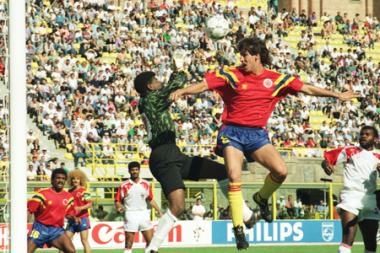The Two Escobars
Written and directed by Jeff Zimbalist and Michael Zimbalist. With Pablo Escobar, Andres Escobar, Rene Higuita, Francisco Maturana, John Jairo Velasquez Vasquez, Fernando Rodriguez Mondragen, Jaime Gaviria and Cesar Gaviria.
Right now, soccer fans all over the globe are glued to their televisions for the month-long affair known as the World Cup. The culmination of a few years of qualifying events and elimination rounds, the Cup is truly a worldwide phenomenon—one that should really make us ashamed of using the World Series title for our little yearly baseball tournament—and one that almost every country on earth takes more seriously than the U.S. does.
Americans have long complained that soccer matches are overlong, with little action; we largely prefer either the rat-a-tat scoring of basketball or the clockwork motion of football and baseball to what’s seen as the more amorphous abstraction of that other kind of football. But like the incessant din of the vuvuzelas (the plastic horns that make every match sound like it’s taking place in a beehive), the infrequent goals are an essential part of the sport’s drama—when, after a long, slow buildup, after back-and-forth exchanges and stops and starts, a player breaks free for the goal, the excitement is unlike anything else in sport.
But in a game of low scores, every point counts, and soccer has a built-in trap: the “own goal,” which occurs when a player scores a goal into his own net. (Though not unheard of in other sports, own goals tend to hurt most in soccer, and the after-effect for a player can be surprisingly long-lived. Our closest American analogue would be something like Bill Buckner’s infamous World Series error.) Surprisingly common, they are usually—ironically—the result of a player trying to make a defensive play to stop an opposing team from scoring. Even the legendary Brazilians, who have won a record five titles, fell victim this year when Felipe Melo’s own goal cost them a victory.
Another own goal is relived at the start of The Two Escobars, a gripping new film from Northampton-born brothers Michael and Jeff Zimbalist (the latter of whom also made the excellent Favela Rising). Andr?s Escobar’s misstep during the 1994 World Cup helped the U.S. team beat Escobar’s heavily favored Colombian squad, dealing them a shocking first-round elimination. Defeated in every sense, Escobar—a soft-spoken player whose sportsmanship earned him the nickname the “Gentleman of the Field”—returned home to Medellin. Shortly after, he was shot dead in a parking lot.
It’s the other Escobar of the title, though, who really provides the story’s biggest drama. That would be Pablo Escobar—no relation to Andres—the infamous drug kingpin and murderer whose love of futbol would thrill a nation and unravel lives.
During the cocaine boom of the early 1980s, Escobar’s fortune skyrocketed to the point that Forbes magazine once listed him as one of the world’s 10 richest men. He employed hundreds, and ran fleets of airplanes and submarines to deliver cocaine to the U.S. It was an unprecedented business whose profits required an equally unprecedented kind of money laundering. In soccer, Escobar found his laundry: at every match, huge amounts of cash changed hands, allowing him to inflate the take and turn his illicit gains into legal tender. And so it was that one Escobar became the boss of the other, when Pablo began financing the national soccer team.
For a time it proved an mutually beneficial arrangement: the team flourished now that it had the money to keep its best players from leaving, and Pablo built new fields for the team and the poor communities of Medellin, helping build a reputation among some as a modern-day Robin Hood. (Years later, the loyalty of the poor would prove helpful when Escobar sought election to Colombia’s House of Representatives in a bid to avoid extradition to the US.) But his success attracted other drug cartels to the sport, giving rise to the era of “Narco-Soccer,” where kingpins lorded over the sidelines, and referees were murdered as retribution for disputed calls.
Everyday Colombians, however, were thrilled with the rise of Atl?tico Nacional, and especially by the showy play of its stars. Some of the footage the Zimbalists incorporate, like the infamous “scorpion-kick” of goalkeeper Rene Higuita (find it on YouTube), is truly breathtaking in its pure athleticism, and the joy the players take in the game is infectious. It’s hard, then, to see when the team begins to be blinded by its own success. Higuita would spend several months in prison on a kidnapping charge, and Escobar’s killings became increasingly high-profile, eventually including both a Minister of Justice and a presidential candidate.
It couldn’t last, of course, but in a surprise twist it was the sudden death of a foreign basketball star that turns the tide. In 1986, American athlete Len Bias died as a result of a cocaine-induced cardiac event; in the aftermath of his death, the U.S. declared war on recreational drug use, sending Special Forces missions into South America. The international ripple effect had devastating results in Colombia, where Escobar’s henchmen regularly engaged the established regime in violent public skirmishes—an era vividly recalled in jailhouse interviews by men like John Jairo Velasquez Vasquez—”Popeye” to friends—who notes that he’s “killed around 250 people, but only a psychopath keeps count.”
Through it all, Andres Escobar is a reminder of how the purity of the sport became tainted when the nation allowed its identity to become tied to the success or failure of the Medellin cartel. Since his death, the Colombian team has never come close to its past success, but today, when fans hold up posters of Escobar during football matches, they are posters of Andres, and not Pablo.
Jack Brown can be reached at cinemadope@gmail.com.



